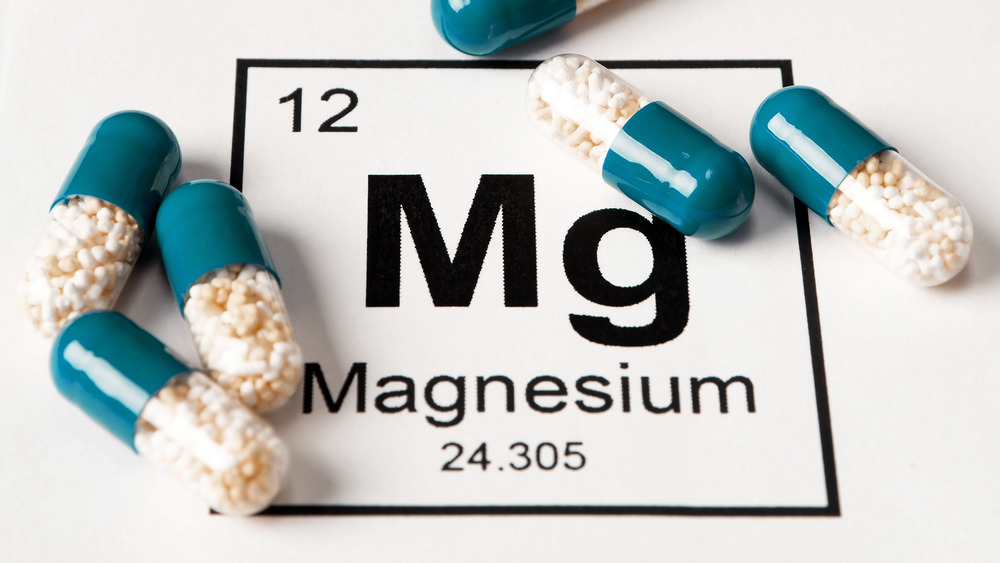The Hidden Side Effects Of Too Much Magnesium
To really understand why the mineral magnesium is so important to your body, we need to talk about enzymes. Without these proteins, crucial chemical reactions in your body wouldn't be able to take place. But more than 300 of these reactions couldn't happen without magnesium, according to Healthline. This is why getting the right amount of magnesium is so important. But beyond this, magnesium has shown promise as a way to help treat different health issues.
For example, research has identified an interesting pattern in sleep. People who have trouble maintaining a healthy sleep cycle also tend to have lower levels of magnesium (via Healthline). What's more, a study published in BMC Complementary Medicine and Therapies found that magnesium supplements taken over an eight-week period improved the sleep of older adults. In addition to possibly improving sleep, a six-week trial also found magnesium supplements taken daily helped with both anxiety and depression.
It's important to note, however, that the magnesium administered in these studies did at times exceed the daily tolerable upper intake limits recommended by the Institute of Medicine. Also, MedlinePlus states that while the scientific community is exploring magnesium's impact on a variety of health issues, "taking magnesium supplements is not currently advised." Indeed, according to Healthline, magnesium supplementation carries various risks and can lead to a host of possible side effects, so it's vital to consult with your healthcare professional before adding a supplement into your routine. Let's dig further into how much magnesium you should be taking in, and what happens to your body if you consume too much.
What is the recommended amount of magnesium?
The amount of magnesium one should take in varies based on factors like age, according to the National Institutes of Health (NIH) Office of Dietary Supplements. For example, the recommended dietary allowance (RDA) of magnesium for an infant (birth to 6 months old) is 30 milligrams daily, regardless of the baby's sex.
Of course, as the baby grows older, their RDA of magnesium increases. However, from the ages of 14 and older, that number is higher for males than females. Also, women need to take into consideration if they're pregnant. For example, a pregnant 25-year-old woman's RDA of magnesium is 350 milligrams per day daily. If she were not pregnant, the RDA would be 310.
Keep in mind that RDAs are based on amounts obtained through foods and drinks, as well as from supplements and medications. Besides the RDA, a person should also be aware of tolerable upper intake levels when it comes to magnesium. And one more important note: As illustrated in a case report published by Pediatric Emergency Care, taking large amounts of certain medications like antacids and laxatives can lead to magnesium toxicity. So, if you frequently have ailments like heartburn or constipation, speak with a healthcare professional about how to treat those conditions safely.
When does magnesium become toxic?
Magnesium is a mineral found in many of the foods that are part of a balanced diet, as well as in some medications. Most of the magnesium we take in comes from food sources like nuts, spinach, wheat bread, black beans, peanut butter, soymilk, and more, according to the NIH. It's also found in some laxatives, in much higher amounts than associated with food, and, in smaller amounts, in medications for indigestion. Since the kidneys excrete excess magnesium from food, it's difficult to get too much magnesium through diet alone. High doses taken in from supplements, however, can lead to dangerously elevated levels.
Magnesium toxicity is called hypermagnesemia, and it happens when too much magnesium is circulating in your bloodstream (via Medical News Today). Some people, notably those with kidney disease, pregnant women being treated for preeclampsia, and patients undergoing cancer treatment are at higher risk for the condition. In addition, hypermagnesemia can develop if someone has hypothyroidism, Addison's disease, or milk-alkali syndrome, according to Medical News Today. Medications like antacids can also increase the magnesium in one's system to toxic levels. Additionally, cathartics used for drug overdoses can also have this effect.
Symptoms of hypermagnesemia include diarrhea, nausea, lethargy, weakness, cardiac electrical system problems, and low blood pressure. Cardiac arrest and respiratory distress can also result (per the NIH).
Side effect: diarrhea
In the animated movie "The Iron Giant," the main character temporarily incapacitates a government agent by tricking him into eating laxatives. The results are exactly what one would expect: medically induced diarrhea. Now, obviously, this is a case of "don't try this at home." It's a movie, and it's meant to be a comedic moment. But in real life, taking too many laxatives can lead not just to needing to run to the bathroom, but also to too much magnesium in your blood.
As the Sunny Meadow Medical Clinic explains, sometimes your intestines and colon do not properly absorb salt, which can slow things down and lead to irregular bowel movements and constipation. Magnesium, however, can counteract the effect of the unabsorbed salt. This is why magnesium is a key ingredient in many laxatives. However, consuming large amounts of laxatives can lead to higher levels of magnesium in your body, which can cause diarrhea. In fact, "laxative abuse" is listed as a cause of diarrhea by WebMD.
Of course, it can be easy to miss this potential side effect of excess magnesium. After all, as WebMD points out, diarrhea can also occur because of a virus or bacteria getting into your system. It's also a symptom of some food allergies, diabetes, an overactive thyroid, intestines-related health issues like Crohn's disease, and even certain types of cancers.
Side effect: depression
Before we explore this next possible side effect of high magnesium, it's important to understand that depression isn't the same thing as occasional sadness, per Medical News Today. Everyone feels sad from time to time, but if a person has depression, that sad feeling can linger no matter what is going on in their life, and can keep occurring for weeks to years.
Now, it can be tricky to determine the source or sources of a person's depression. After all, experts are still working to understand the condition. Nevertheless, absorbing high amounts of magnesium can result in depression (via Medical News Today). Still, it is important to consider other factors, like your environment and genetics.
The bottom line? If you think you're experiencing depression, seek medical help. A healthcare professional can not only test for high magnesium levels, but also determine if other factors could be at play. And although you shouldn't diagnose yourself or someone else, be aware of possible red flags when it comes to depression, like fatigue, indecisiveness, and changes in appetite.
Side effect: slower heart rate
Think about the last time your heart was racing. Maybe you just finished a particularly intense workout, or were in a stressful situation. Whatever the reason, chances are that racing heart was a bit uncomfortable. And you likely know that a heart rate that remains too high can be dangerous; however, a heart rate that is too slow can also be dangerous, and this condition is connected to both kidney issues and excess magnesium.
According to the Mayo Clinic, an adult's resting heart rate should fall between 60 and 100 beats per minute. However, if your heart beats fewer than 60 times a minute (a condition known as bradycardia), your body could have a harder time circulating oxygen, which can lead to breathing issues as well as weakness and dizziness. In addition, a person with bradycardia could experience heart failure, cardiac arrest, fainting spells, and in the worst-case scenario, even death.
While overdosing on magnesium supplements can cause a "slow heartbeat," the Mayo Clinic points out that this is less likely to occur in individuals with healthy kidneys that are properly filtering their bloodstream. If you have kidney issues, however, you may want to ask your healthcare professional about checking your magnesium levels — especially if you have bradycardia.
Of course, an excess of magnesium is not the only thing that can cause bradycardia. The wrong amount of calcium or potassium in your blood can also lead to the condition (via Mayo Clinic). Other potential causes include medical conditions like lupus, heart disease, obstructive sleep apnea, hypothyroidism, and a congenital heart defect, as well as certain medications like opioids and sedatives.
Side effect: drop in blood pressure
Usually, when one thinks of blood pressure-related health issues, the first thing that comes to mind is hypertension (a.k.a high blood pressure). However, blood pressure dropping too low, known as hypotension, can also be dangerous. And if you have kidney issues that interfere with how well your kidneys can filter excess magnesium from your blood, taking in higher-than-recommended amounts of this mineral is more likely to cause drops in blood pressure (per Healthgrades).
While it's possible not to have any major issues because of it, a person with hypotension could feel dizzy and faint. In addition, a person could experience brain damage, as drops in blood pressure make it harder for the circulatory system to transport oxygen throughout the body. Similarly, the heart itself can find it's not receiving enough oxygen and become injured.
While hypotension can be a sign of excess magnesium, it can also be connected to a slow heart rate or bradycardia, according to the Mayo Clinic. And remember, bradycardia can happen because of too much magnesium in one's system, per Mayo Clinic. Also, hypotension can happen because a person doesn't have enough of certain nutrients (like iron, B-12, and folate), is dehydrated, or has lost a large amount of blood. Furthermore, if you're pregnant, you also might experience lower blood pressure.
Side effect: difficulty breathing
Next time you're at the store, look at the ingredients on a roll or container of antacids. If you see magnesium and calcium carbonate, then it's especially important not to take too many of that medication. As Mount Sinai explains, overdosing on both magnesium and calcium carbonate can cause breathing issues, which can result in a person breathing rapidly and only being able to take shallow breaths.
Remember, even though a person experiencing this reaction to a calcium carbonate and magnesium overdose can still breathe, what they're experiencing is a medical emergency, according to Mount Sinai. In fact, any breathing issues are an emergency unless they're occurring because of something that's typically benign, like having a little trouble catching one's breath after working out. But since a number of different situations and conditions can make it harder to breathe, it can be difficult to pinpoint taking too many antacids as the cause. For example, breathing issues can occur because of allergies, anemia, or heart problems like heart disease. It also can happen if the lungs become injured or if one of them collapses or has a blood clot inside of it. Even being at a high altitude can make it harder to breathe.
The bottom line is that breathing issues like the kind caused by overdosing on magnesium and calcium carbonate require immediate medical help. Mount Sinai recommends calling 9-1-1, and if an overdose is involved, contacting the Poison Help hotline at 1-800-222-1222.
Side effect: facial flushing
We've probably all experienced facial flushing because of our emotions. However, as Science Direct notes, this type of flushing can also happen as a result of too much magnesium in the blood.
Keep in mind that the reason we become flushed is because blood vessels located in our face dilate, which increases the amount of blood in those vessels, according to Medical News Today. Unfortunately, since flushing is pretty common, it might not be obvious when it's being caused by hypermagnesemia (or excess magnesium), per Science Direct. And since this condition can be life-threatening, a person could be putting themselves in danger if they don't seek medical help. Additionally, facial flushing can also occur because of medications, and that can confuse the situation even further. For example, calcium-channel blockers (which the Cleveland Clinic notes are recommended for medical conditions like arrhythmia and angina) can lead to flushing.
Besides calcium-channel blockers, certain antibiotics can also cause facial flushing (per Medical News Today). So can vasodilators, which as Everyday Health explains cause your blood vessels to expand. The point is, if you're experiencing facial flushing for no apparent reason, you need to speak with your doctor. Only they can determine if excess magnesium is the cause.
Side effect: muscle weakness
Have you ever been told to take supplemental magnesium for muscle cramps? As Harvard explains, this is a fairly common practice, especially for cramps that occur in the feet and legs. However, the site points out that magnesium supplements as a treatment for muscles cramps is not backed by current data. What's more, muscle weakness can be a sign that you have too much magnesium in your system.
Remember, we are still exploring the potential of magnesium as a treatment for medical conditions, but right now magnesium supplements are "not currently advised" as a way to help with different health issues, per MedlinePlus. So, taking large amounts of magnesium in supplement form to help with muscle cramps could mean you're trading off one type of muscle problem for another. In addition, other factors can also contribute to muscle weakness. For example, according to WebMD, weakness can also be caused by repetitive motions, or by one-time events that strain your muscles beyond their capacity. Also, a person in their 60s or 70s is more likely to lose muscle mass, and so become more prone to muscle weakness.
The point is, it's easy to find other more obvious reasons for muscle weakness than either low or high magnesium levels, which can mean missing out on a potentially simple solution. The good news is your medical team l can help you narrow down the cause behind muscle weakness, including whether or not magnesium is to blame.
Side effect: lethargy
We've all felt tired, but lethargy is feeling fatigued that affects you on multiple levels, per Healthline. When you're lethargic, everything can seem to slow down. You might not be moving as fast, and your energy levels could be much lower than usual. Even your cognitive functions and mood can be thrown off by this condition. And as Oregon State University notes, lethargy and all its potential symptoms can be signaling high levels of magnesium in one's bloodstream.
Of course, it can be extremely hard to figure out that excess magnesium is the culprit behind one's lethargy. For one, it's possible to confuse being lethargic and being very tired. And for another, quite a few medical conditions list lethargy as a possible symptom. For example, a person could feel lethargic when they have the flu and/or are running a fever. Stomach viruses and lethargy can also go hand in hand. Kidney failure can also cause lethargy, and remember, if your kidneys aren't functioning properly, that can increase the chances of developing hypermagnesemia (a.k.a. excess levels of magnesium), via Medical News Today. Additional health issues that can cause lethargy include meningitis and Lyme disease.
Frankly, we've only scratched the surface on all the possible reasons why one might feel lethargic. So, it's important to listen to your body when you're feeling sluggish. It could be trying to warn you about a number of health concerns, including that you may have magnesium toxicity.
How to test for excess magnesium
So, say you've been taking magnesium supplements and begin experiencing one of the symptoms mentioned in this article. You suspect that you have excess magnesium and are ready to throw all the remaining supplements away. However, this is exactly what you should NOT do, per Healthline.
First, if a healthcare professional recommended magnesium supplements, you shouldn't discontinue taking the supplements without speaking to them. Second, while you might think your magnesium is too high, only a medical professional can determine if this is actually the case. This is done through a serum magnesium blood test, where someone's blood is tested at a lab (via Healthline). Besides checking magnesium levels, the test factors in other details like a person's sex and age, as well as their body type and overall health. So, if you are worried that you might have too much magnesium in your blood, you should let your healthcare team know about any possible symptoms of excess magnesium you're experiencing. Also, make sure they know whether or not you're taking supplements and medications that contain magnesium, and the dosage you're taking.












